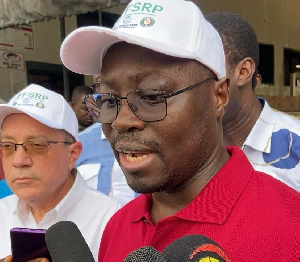NDC’s Response To Some Statements Made By President Kufour AT THE KASUA RALLY AND THE TAKORADI CONGRESS OF THE NPP
BY
HON. DR. KWAME AMPOFO, MP, South Dayi Constituency, FORMER RANKING MEMBER, PARLIAMENTARY SELECT COMMITTEE ON MINES AND ENERGY
Distinguished Ladies and Gentlemen of the Press, permit me (on behalf of our Party) to welcome you to this press conference and express our sincere gratitude for responding to our invitation, at such short notice.
Ladies and Gentlemen, on Saturday July 12, 2008, the NPP held a rally at Kasoa. At that rally, President Kufuor made several claims concerning the oil and gas industry of Ghana that were absolute misrepresentations of the facts and downright fabrications. Again, at their just ended congress at Takoradi, those fabrications were repeated, either directly or through insinuations. We are by this statement setting the records straight.
Ladies and Gentlemen, the President, in seeking to claim credit for the recent oil discovery in Ghana’s Exclusive Economic Zone off the coast of Cape Three Points for his Government and his party’s tradition, stated the following:
“The search for oil started under the Busia regime [of which he was a part] but the efforts were stalled with the overthrow of the government by the Acheampong coup d’etat”.
He then went on to explain, putting a rather superstitious twist to it that:
“the resource simply vanished thereafter but resurfaced under the NPP administration”.
President Kufuor further claimed that:
“The crude oil was discovered through the provision of funding for exploration and that the previous administration was squandering money during their tenure, ostensibly looking for oil”.
Dear friends, as has become unfortunately characteristic of President Kufuor, these statements are neither supported by the facts of history of oil exploration in Ghana nor by common sense.
First of all, science has firmly established how oil and gas resources of the world have been formed. Universally accepted scientific evidence tells us that oil and gas resources around the world were formed as a result of the fossilization of organic matter during pre-historic times. So even though we should be thankful to the Almighty for locating some of this valuable resource in Ghana, it is absurd for President Kufuor to link the presence of oil in Ghana to the coming into being of governments of the Busia-Danquah political tradition.
Contrary to President Kufuor’s claims, the search for oil started in the 19th century, around 1896 and long before the Busia government came into office. It is incredible that the President should tell such a lie. Exploration for oil started in the onshore areas of Tano in the Western Region by the West Africa Oil and Fuel Company (WAOFCO). Between 1896 and 1903, WAOFCO drilled five (5) wells, one of which resulted in a discovery. This WAOFCO-2 is the first ever documented oil discovery well in Ghana.
Between 1909 and 1913, a French company, Societe Francaise de Petrole (SFP) also drilled six (6) wells. The first well, SFP-1 struck oil at a depth of 10-17 metres and produced 7 barrels of oil per day (bopd). Four (4) of the five (5) remaining wells also had very good oil indications and flows at relatively shallow depths.
African and Eastern Trade Corporation (AETC), a subsidiary of United African Company (UAC) drilled two wells in the onshore Tano area between 1923 and 1925 and both encountered oil and gas.
Thereafter, Gulf Oil Company acquired the Onshore Tano license and drilled four (4) deep wells in the area between the period 1956 to 1957.
Between 1960 and 1967, Soviet and Romanian geo-scientists explored for oil and gas in the Voltaian and Accra/Keta Basins. Through these exploratory activities, the necessary geological data was collected that directed the national effort to shift from the onshore areas to the offshore shallow waters. After 1967 when the Soviets and the Romanians left, new companies came to do more drilling specifically in the offshore area. That was when oil was encountered in the Saltpond Basin. It will be recalled that sometime in 1971, Mr R.R. Amponsah went to Parliament to exhibit a sample of oil collected from one of those exploration wells. However, the first commercial hydrocarbon production offshore and in the Saltpond Basin commenced only in 1975 under General Kutu Acheampong’s NRC Government and was operated by Agripetco.
All this time the oil and petroleum sector was managed by a Civil Service Department, the Petroleum Department of the Ministry of Fuel and Power. It was the PNDC that decided to revolutionise the oil and petroleum sector by passing the Ghana National Petroleum Corporation (GNPC) Law, 1983, (PNDCL 64). Under section 26 of that Law, suitable staff of the Petroleum Department were transferred to form the core of the GNPC.
This much was admitted in a paper delivered at the National Forum on Oil and Gas Development at GIMPA in February 2008 by the current Chief Executive Officer of the GNPC, Mr. Moses O. Boateng, when he stated as follows:
“From 1984, exploration activities took a new turn with the PNDC Government establishing capacity (PNDCL 64), as well as statutory and legal framework that would accelerate the country’s Exploration and Production (E&P) efforts”.
Thus the GNPC, becoming operational in 1985, effectively spearheaded exploration and production activities in Ghana till this day and the national effort in searching for oil was greatly intensified in a coordinated manner. To accelerate exploration efforts, the GNPC funded the acquisition, processing and interpretation of the first 3-D seismic data over the South Tano Field and other areas between 1989 and 1991. The GNPC subsequently drilled several wells that established the viability of three fields in the Tano area namely: • The North Tano (Gas) Field with estimated reserves of over 73 billion cubic feet of gas; • The Tano South (Oil and Gas) Field with estimated reserves of over 14 million barrels of oil and about 120 billion cubic feet of gas; • The West Tano (Oil) Field bearing heavy crude oil estimated at over 4.0 million barrels. In deed, it is on record that GNPC produced over 62,000 barrels of oil in the South Tano fields (under the PNDC) in 1992. This production of oil was transparently refined at TOR.
The GNPC worked hard to attract several companies to conduct exploration activities in the offshore basin of the country. These included Dana Petroleum, Nuevo Energy, AGIP, Diamond Shamrock, Devon Energy, Santa Fe Energy and Fusion Oil. Their activities resulted in the accumulation of a large volume of valuable data that was to become useful for future operations in the search for oil, including the current commercial finds.
Other landmark contributions made in the past that have helped the current successes in the oil and gas industry include: • The enactment of the Petroleum (Exploration and Production) Law, 1984, PNDCL 84, by the PNDC Government which established the legal and fiscal framework for the conduct of petroleum exploration and production activities in Ghana. Again in the words of the current CEO of the GNPC:
“GNPC was to become a virtual one stop shop for investors in the upstream petroleum industry in Ghana”.
• The enactment of the Petroleum Income Tax Law, 1987, PNDCL 188, again by the PNDC Government which provides a separate tax regime for the petroleum sector. • The formulation of a Model Petroleum Agreement as the main Guide for Petroleum Agreements to date.
From the above, it is very clear that: i. The search for oil started at least 73 years before the Busia Government came into office as that Government only came into being in 1969 and was overthrown in 1972; ii. It is false for anyone to state that ‘the oil vanished thereafter but resurfaced under the NPP administration. Oil was produced in Ghana from the Saltpond field from 1979 to 1984; iii. It is again false for anyone to state that the previous administration “was squandering money during their tenure ostensibly looking for oil”. Every one knows that it is the hard work of GNPC under the PNDC and NDC administrations that has attracted so much investment into the oil and gas industry as we find today.
Ladies and Gentlemen, it is rather unfortunate, but President Kufuor’s penchant for telling lies when it comes to the energy sector has now become legendary. A few reminders will suffice: • In a Voice of America “Straight Talk” programme telecast live on Wednesday May 25, 2005, President Kufuor told the host, Shaka Shali, that natural gas had been discovered in commercial quantities and that within the next few years, the country would bounce back. This turned out to be untrue. He merely was refusing to acknowledge the laudable achievement of GNPC under the NDC and led by Mr. Tsatsu Tsikata. • In the early months of 2006, President Kufuor and his administration lied to Ghanaians that all was well with the Akosombo dam until the onset of the devastating year-long power crisis, when it was no longer possible to lie. • During the power crisis of 2006-2007, the President assured the country that Nigeria and La Cote d’Ivoire were going to supply 200 megawatts of electric power to Ghana within a fortnight. This also turned out to be a lie. At the time, when he was challenged by the NDC, his spin doctors backtracked but he himself never spoke on the subject again. It was simply a lie of convenience told to Parliament to divert attention from his Government’s irresponsibility that had created the crisis in the first place. • At the NPP congress in December of 2007, President Kufuor assured his partisan audience that natural gas would flow through the West African Gas Pipeline in a matter of weeks. This assurance has turned out to be a lie, as the suppliers in Nigeria have categorically declared that gas would not be available until sometime in 2009! • When his lies got exposed while the energy crisis deepened, President Kufuor, in his desperation to allay the fears of Ghanaians to a bleak future, lied about developing NUCLEAR energy to solve the power crisis. • Even though the company that has made the oil find, Kosmos, estimates that the first oil flow will be in 2010, President Kufuor and his Government want Ghanaians to believe that the oil will be flowing this year.
My good friends of the media, it is time we told the President that he must tell the people the truth at all times. The economy cannot be nurtured to grow if the power entrusted to him and his Government would be abused by claiming credit for other people’s efforts and by telling lies that things are fine when, in actual fact, things are in a total mess.
Dear friends, President Kufour’s charge that “the previous administration was squandering money during their tenure” is irresponsible and amounts to “the pot calling the kettle black”!
It will be recalled that in 2003 (under this NPP administration) a whole ship-load of oil produced from the Saltpond fields, developed under the NDC, was stolen and clandestinely taken out of Ghana to Nigeria. To this day, this cargo of oil is yet to be accounted for.
It will also be recalled that the NPP government has un-ingeniously signed petroleum agreements with oil companies for exploration involving concession blocks in the Tano Area that are known to have three (3) discoveries that have actually been ready for development and production since the mid-nineties, the basis for which the Osagyefo barge was constructed by the NDC government through the wise initiative of Mr. Tsatsu Tsikata. These are the North Tano Gas Discovery, the South Tano Oil and Gas Discovery and the West Tano Heavy Oil Discovery. As a matter of fact, GNPC, through appraisal work conducted on the fields, estimates that the reserves in the South Tano Field alone contain over 14 million barrels of oil and 193 billion cubic feet of gas.
Since these fields are owned by GNPC (on behalf of the people of Ghana) and since they are known to contain such fairly large reserves, it is UNREASONABLE for government to treat them as pure exploration assets and should have been excluded from the current exploration agreement with Tullow Energy, as that seriously undervalues the reserves. In fact, this ridiculous arrangement has resulted in unnecessary delay in the availability and use of our indigenous gas for power generation which is desperately needed by the national economy through the Osagyefo Power Barge which was constructed for that purpose.
Ladies and Gentlemen, valuable resources meant for energy sector development are known to have been diverted into private purses or simply squandered.
On one occasion, ¢662 million out of the Energy Fund was spent by the then CEO of the Energy Commission on the refrigeration in his car. On another occasion, hundreds of thousands of US dollars out of the Exploration Fund was used to pay for the forensic audit into the GNPC, not for oil exploration.
Under the NPP Government, Ghana’s flagstar state-owned organisation, the VRA has been bankrupted, owing over US$800 million in debts. The Tema Oil Refinery (TOR) is similarly indebted to the tune of over US$500 million.
Friends of the Press, the President, his Government and his NPP party are advised to commit themselves to protecting the national interest rather than the “rat race” for wealth acquisition that they are engaged in, mostly through corrupt and foul means dictated by their “property-owning” ideology.
In this regard, we are concerned about reports that the NPP government has already mortgaged our oil reserves and also is in the process of trading off more of our oil reserves with Gabon (Business Week, July 21-27, 2008) and other countries to offset difficulties that the economy is encountering due to their incompetence, recklessness and blatant corruption.
We wish to notify them that whilst they are gloating over the oil find, NDC experts are already busy working on the critical issues that ought to be addressed to ensure that we provide prudent management and investment of the oil revenue and that the oil find is beneficial to the country. These measures include a petroleum policy, a legal and contractual framework, a good governance structure, a social impact management system, a fiscal administration system, a revenue management system, a human resources development plan and several others.
Ladies and Gentlemen, we will prove to President Kufuor and the NPP that we have always had a plan for the energy sector and that we do not need propaganda and superstition to prove our worth when it comes to management of the energy sector. The people of Ghana can trust the NDC with the nation’s natural resources and other strategic assets. Ghanaians should not allow the NPP to lie and deceive them to get to power again.
Thank you for your attention.
General News of Monday, 25 August 2008
Source: NDC












